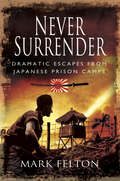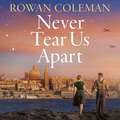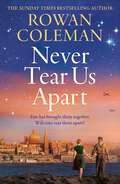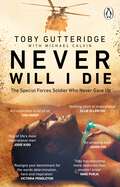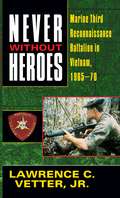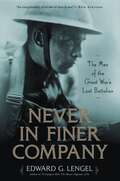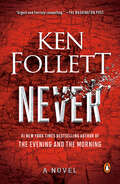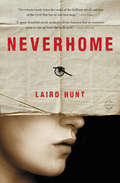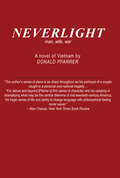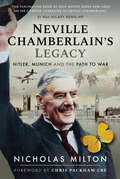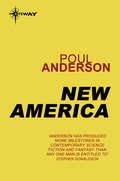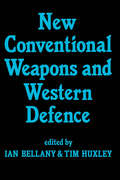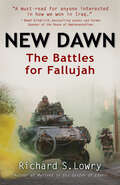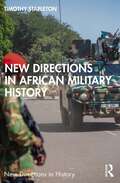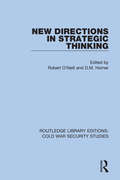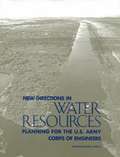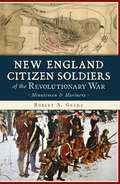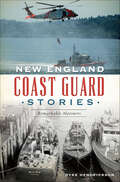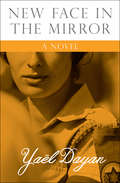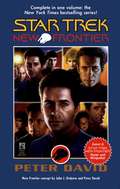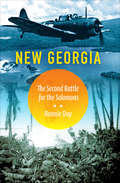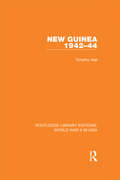- Table View
- List View
Never Surrender: Dramatic Escapes from Japanese Prison Camps
by Mark FeltonWhile there have been many fine books covering the appalling experiences and great courage of the many thousands of POWscaptured by the victorious Japanese during late 1941 and early 1942, escape accounts are much rarer. This is due in large part tothe fact that only a comparatively small number of brave souls attempted to escape to freedom rather than suffer brutality,starvation and very possibly death as POWs. However, as Never Surrender vividly describes, there were a significant number who took this desperate course. Escapersfaced challenges far more daunting than those in German hands. They were Westerners in an alien, hostile environment; the terrain and climate were extreme; disease was rife; their physical condition was weak; there was every chance of starvation andbetrayal and, if captured, they faced, at best, the harshest punishment and, at worst, execution. The author draws on escapeattempts from Hong Kong, Thailand, the Philippines, Borneo and China by officers and men of the British, Commonwealth andUS armed forces. As this superbly researched and uplifting book reveals, few escapers found freedom but all are inspiring examples of outstandingand, indeed, desperate courage. The stories told within these pages demonstrate the best and worst of human spirit.
Never Tear Us Apart: a spellbinding, sweeping historical story about love, war and fate, new for 2025 from the bestselling author
by Rowan ColemanA spellbinding tale of love, strength and sacrifice from the Sunday Times bestselling author. Based on the gorgeous island of Malta in WWII, this is a story about the power of fate, and how sometimes, in order to find yourself - and to find love - you must first lose everything else. . .Fate has brought them together. Will time tear them apart?2025Named after a star, war correspondent Maia knows how to find the brightest stories - the tales of survival and strength - hidden amongst the dark realities of combat.Now, travelling to Malta to visit her estranged father, with one more chance to build a relationship with her last remaining relative, she's here to find her own story: never having found somewhere - or someone - she can call home, she's desperate for answers that might show her where she truly belongs.But when she arrives on the beautiful mediterranean island, she realises her long-lost family is full of more secrets than she could possibly have imagined. . .1942Maia wakes up to find herself on an island under siege, a city in ruins - and knows she must have been sent here for a reason.Who has she been sent to save? Or is it Maia herself that needs saving? And just when she's finally found what she's been seeking . . . will time separate them forever? Perfect for fans of Lucinda Riley, Santa Montefiore and Dinah Jefferies.YOUR FAVOURITE AUTHORS LOVE ROWAN COLEMAN:'An incredible story of love and hope' KATIE FFORDE'It's so lovely to find an author you love' MARIAN KEYES'Such a brilliant writer' JILL MANSELL'I've always loved Rowan's writing' LUCY DILLON'There is a lovely smooth glow to the writing' MATT HAIG'Life-affirming and joyful' SARA SHERIDAN'A time-travelling delight' EVE CHASE'Gloriously romantic and deeply moving' LUCY DIAMOND'A stunning book about what it takes to be truly alive' JULIE COHEN'Wonderful . . . both emotional and utterly captivating' JILL MANSELL'A book you will carry with you long after the last page' MILLY JOHNSON'Up there alongside The Time Traveller's Wife' CAROLE MATTHEWS'Captivating and completely unforgettable, Vita and Ben's love story made me believe the impossible might not be so far out of reach' JULIETTA HENDERSON
Never Tear Us Apart: a spellbinding, sweeping historical story about love, war and fate, new for 2025 from the bestselling author
by Rowan ColemanA spellbinding tale of love, strength and sacrifice from the Sunday Times bestselling author. Based on the gorgeous island of Malta in WWII, this is a story about the power of fate, and how sometimes, in order to find yourself - and to find love - you must first lose everything else. . .Fate has brought them together. Will time tear them apart?2025Named after a star, war correspondent Maia knows how to find the brightest stories - the tales of survival and strength - hidden amongst the dark realities of combat.Now, travelling to Malta to visit her estranged father, with one more chance to build a relationship with her last remaining relative, she's here to find her own story: never having found somewhere - or someone - she can call home, she's desperate for answers that might show her where she truly belongs.But when she arrives on the beautiful mediterranean island, she realises her long-lost family is full of more secrets than she could possibly have imagined. . .1942Maia wakes up to find herself on an island under siege, a city in ruins - and knows she must have been sent here for a reason.Who has she been sent to save? Or is it Maia herself that needs saving? And just when she's finally found what she's been seeking . . . will time separate them forever?Perfect for fans of Lucinda Riley, Santa Montefiore and Dinah Jefferies.YOUR FAVOURITE AUTHORS LOVE ROWAN COLEMAN:'An incredible story of love and hope' KATIE FFORDE'It's so lovely to find an author you love' MARIAN KEYES'Such a brilliant writer' JILL MANSELL'I've always loved Rowan's writing' LUCY DILLON'There is a lovely smooth glow to the writing' MATT HAIG'Life-affirming and joyful' SARA SHERIDAN'A time-travelling delight' EVE CHASE'Gloriously romantic and deeply moving' LUCY DIAMOND'A stunning book about what it takes to be truly alive' JULIE COHEN'Wonderful . . . both emotional and utterly captivating' JILL MANSELL'A book you will carry with you long after the last page' MILLY JOHNSON'Up there alongside The Time Traveller's Wife' CAROLE MATTHEWS'Captivating and completely unforgettable, Vita and Ben's love story made me believe the impossible might not be so far out of reach' JULIETTA HENDERSON
Never Will I Die: The inspiring Special Forces soldier who cheated death and learned to live again
by Michael Calvin Toby GutteridgeThere's no pain, no theatrical agony. No screaming, no shouting. The kill shot is catastrophic and conclusive. I slump silently on to my knees and topple forward, head first, into the dirt. The lads have seen enough death to assume mine is instantaneous. The lights are out. That's him gone.Toby Gutteridge was only 24 when he was shot through the neck while operating behind enemy lines in Afghanistan. He survived despite not breathing for at least 20 minutes. Back in the UK, doctors recommended that his life support machine be switched off, but with the defiant spirit that would define his recovery, Toby pulled through.Now quadriplegic, capable of movement only with his head, Toby has rebuilt his life. His is an extraordinary story of survival against overwhelming odds, and of the power of the human spirit to overcome extreme adversity. Brutally honest and authentic, he builds a compelling picture of the type of person produced by the Special Forces system, and tells of how one split second changed the course of his life forever.Powerful and inspiring, Never Will I Die is a universal story about our search for purpose, and explores what extreme experience teaches us about what truly matters.
Never Without Heroes: Marine Third Reconnaissance Battalion in Vietnam, 1965-70
by Lawrence C. Vetter Jr.FOUR CONGRESSIONAL MEDALS OF HONOR,THIRTEEN NAVAL CROSSES,SEVENTY-TWO SILVER STARS . . .In four and a half years in Vietnam, the Marines of the Third Reconnaissance Battalion repeatedly penetrated North Vietnamese and Vietcong sanctuaries by foot and by helicopter to find enemy forces, learn the enemy's intentions, and, when possible, bring deadly fire down on his head. Heavily armed, well-camouflaged teams of six and eight men daily exposed themselves to overwhelming enemy forces so that other Marines would have the information necessary to fight the war.It's all here: grueling, tense, and deadly recon patrols; insertions directly into NVA basecamps; last-stand defenses in the wreckage of downed helicopters; pursuit by superior North Vietnamese forces; agonizing deaths of men who valiantly put their lives on the line.NEVER WITHOUT HEROES is the first book to recount the story of a Marine reconnaissance battalion in Vietnam from the day of its arrival to its withdrawal. In Vietnam, Larry Vetter served as a platoon leader in Third Recon Battalion. He supplements his own recollections with Marine Corps records, exhaustive interviews with veterans, and correspondence to capture the bravery, and self-sacrifice of war.From the Paperback edition.
Never in Finer Company: The Men of the Great War's Lost Battalion
by Edward G. LengelIt was one of the most heroic events in American military history. Here is the larger-than-life story of World War I's "Lost Battalion" and the men who survived the ordeal, triumphed in battle, and fought the demons that lingered.In the first week of October, 1918, six hundred men attacked into Europe's forbidding Argonne Forest. Against all odds, they surged through enemy lines--alone. They were soon surrounded and besieged. As they ran out of ammunition, water, and food, the doughboys withstood constant bombardment and relentless enemy assaults. Seven days later, only 194 soldiers from the original unit walked out of the forest. The stand of the US Army's "Lost Battalion" remains an unprecedented display of heroism under fire.Never in Finer Company tells the stories of four men whose lives were forever changed by the ordeal: Major Charles Whittlesey, a lawyer dedicated to serving his men at any cost; Captain George McMurtry, a New York stockbroker who becomes a tower of strength under fire; Corporal Alvin York, a country farmer whose famous exploits help rescue his beleaguered comrades; and Damon Runyon, an intrepid newspaper man who interviews the survivors and weaves their experiences into the American epic. Emerging from the patriotic frenzy that sent young men "over there," each of these four men trod a unique path to the October days that engulfed them--and continued to haunt them as they struggled to find peace.Uplifting and compelling, Never in Finer Company is a deeply moving and dramatic story on an epic scale.
Never: A Novel
by Ken FollettThe new must-read epic from master storyteller Ken Follett: more than a thriller, it’s an action-packed, globe-spanning drama set in the present day. <P><P>So says Pauline Green, president of the United States, in Follett’s nerve-racking drama of international tension. A shrinking oasis in the Sahara Desert; a stolen US Army drone; an uninhabited Japanese island; and one country’s secret stash of deadly chemical poisons: all these play roles in a relentlessly escalating crisis. <P><P>Struggling to prevent the outbreak of world war are a young woman intelligence officer; a spy working undercover with jihadists; a brilliant Chinese spymaster; and Pauline herself, beleaguered by a populist rival for the next president election. Never is an extraordinary novel, full of heroines and villains, false prophets and elite warriors, jaded politicians and opportunistic revolutionaries. It brims with cautionary wisdom for our times, and delivers a visceral, heart-pounding read that transports readers to the brink of the unimaginable. <P><P><B>A New York Times Best Seller</b>
Neverhome: A Novel
by Laird HuntShe calls herself Ash, but that's not her real name. She is a farmer's faithful wife, but she has left her husband to don the uniform of a Union soldier in the Civil War. NEVERHOME tells the harrowing story of Ash Thompson during the battle for the South. Through bloodshed and hysteria and heartbreak, she becomes a hero, a folk legend, a madwoman and a traitor to the American cause.Laird Hunt's dazzling new novel throws a light on the adventurous women who chose to fight instead of stay behind. It is also a mystery story: why did Ash leave and her husband stay? Why can she not return? What will she have to go through to make it back home? In gorgeous prose, Hunt's rebellious young heroine fights her way through history, and back home to her husband, and finally into our hearts.
Neverlight
by Donald PfarrerNeverlight explores the marriage of Richard and Katherine Vail as Richard fights a war that Katherine comes to abhor. Richard is a volunteer, a naval gunfire officer serving with the Marine infantry in Vietnam. <P><P> Katherine lives a secluded life with their daughter Terry in the New Hampshire woods. Directing the big weapons, naval guns and Marine Corps artillery, Richard makes his decisions hour by hour -- at incalculable cost. Katherine is tormented by her body's loneliness and by her horror at the daily drumming of news from the war. If her husband is the good man she believes he is, how can he kill? Richard doesn't see it quite that way. He asks, rather, If he is the man he should be, how could he place himself anywhere else but with his men? Katherine finds that "bathing" in the snow can chill her body but not suppress its longings. Richard finds that the intervals of "peace" between combat operations are harder to endure than the fighting. Two powerful forces are pulling him apart, love for his wife and daughter back home, and the rhythm of fight and recovery Vietnam.Donald Pfarrer was awarded the Bronze Star and the Purple Heart for his service in the Vietnam War. On returning from Vietnam Pfarrer covered the antiwar movement for the Milwaukee Journal. He later wrote extensively for the paper on crime and politics. He is a graduate of Harvard College and the authoir of five novels. He is currently writing a novel about an adulterous love affair in wartime. His next project will be a novel placed within the legal system. More detail can be found at donaldpfarrer.com
Neville Chamberlain's Legacy: Hitler, Munich and the Path to War
by Nicholas MiltonA biography reassessing the man whose name became a synonym for appeasement: &“An important read for anyone with an interest in the prelude to World War II.&” —The NYMAS Review Neville Chamberlain has gone down in history as the architect of appeasement, the prime minister who by sacrificing Czechoslovakia at Munich in September 1938 put Britain on an inevitable path to war. In this radical new appraisal of one of the most vilified politicians of the twentieth century, historian Nicholas Milton claims that by placating Hitler, Chamberlain not only reflected public opinion but also embraced the zeitgeist of the time. Chamberlain also bought Britain vital time to rearm when Hitler&’s military machine was at its zenith. It is with the hindsight of history that we understand Chamberlain&’s failure to ultimately prevent a war from happening. Yet by placing him within the context of his time, this fascinating new history provides a unique perspective into the lives and mindset of the people of Britain during the lead up to the Second World War. Never before have Chamberlain&’s letters been accessed to tell the story of his life and work. They shed new light on his complex character and enable us to consider Chamberlain the man, not just the statesman. His role as a pioneer of conservation is revealed, alongside his work in improving midwifery and championing the introduction of widows&’ pensions. Neville Chamberlain&’s Legacy is a reminder that there is often more to political figures than many a quick judgment allows.
Neville Chamberlain's Legacy: Hitler, Munich and the Path to War
by Nicholas MiltonA biography reassessing the man whose name became a synonym for appeasement: &“An important read for anyone with an interest in the prelude to World War II.&” —The NYMAS Review Neville Chamberlain has gone down in history as the architect of appeasement, the prime minister who by sacrificing Czechoslovakia at Munich in September 1938 put Britain on an inevitable path to war. In this radical new appraisal of one of the most vilified politicians of the twentieth century, historian Nicholas Milton claims that by placating Hitler, Chamberlain not only reflected public opinion but also embraced the zeitgeist of the time. Chamberlain also bought Britain vital time to rearm when Hitler&’s military machine was at its zenith. It is with the hindsight of history that we understand Chamberlain&’s failure to ultimately prevent a war from happening. Yet by placing him within the context of his time, this fascinating new history provides a unique perspective into the lives and mindset of the people of Britain during the lead up to the Second World War. Never before have Chamberlain&’s letters been accessed to tell the story of his life and work. They shed new light on his complex character and enable us to consider Chamberlain the man, not just the statesman. His role as a pioneer of conservation is revealed, alongside his work in improving midwifery and championing the introduction of widows&’ pensions. Neville Chamberlain&’s Legacy is a reminder that there is often more to political figures than many a quick judgment allows.
New America
by Poul AndersonThe benevolent, paternalistic World State regarded the freedom-minded Jeffersonians as a minor embarrassment whose violent elimination would cause more disruption than their demise would merit. So both sides were happy when the chance came for voluntary exile to a distant planet. But two hundred years later the less benevolent descendant of the World State that had let them go was to decide that the cosmos was not big enough to hold both it and a free people.
New Approaches to European History: The Extermination of the European Jews
by Christian GerlachThis major reinterpretation of the Holocaust surveys the destruction of the European Jews within the broader context of Nazi violence against other victim groups. Christian Gerlach offers a unique social history of mass violence which reveals why particular groups were persecuted and what it was that connected the fate of these groups and the policies against them. He explores the diverse ideological, political and economic motivations which lay behind the murder of the Jews and charts the changing dynamics of persecution during the course of the war. The book brings together both German actions and those of non-German states and societies, shedding new light on the different groups and vested interests involved and their role in the persecution of non-Jews as well. Ranging across continental Europe, it reveals that popular notions of race were often more important in shaping persecution than scientific racism or Nazi dogma.
New Approaches to European History: The Origins of the First World War
by William MulliganProviding a new interpretation of the origins of the First World War, this textbook synthesises recent scholarship and introduces the major historiographical and political debates surrounding the outbreak of the war. William Mulligan argues that the war was a far from inevitable outcome of international politics in the early twentieth century and suggests instead that there were powerful forces operating in favour of the maintenance of peace. His fresh perspective on the pre-war international system takes account of new approaches to the study of international politics since the end of the Cold War and the acceleration of globalisation. Thematic chapters examine key issues, including the military, public opinion, economics, diplomacy and geopolitics, and analyse relations between the great powers, the role of smaller states, the disintegrating empires and the July crisis. This compelling account will significantly revise our understanding of diplomacy, political culture, and economic history from 1870 to 1914.
New Conventional Weapons and Western Defence
by Ian Bellany Tim HuxleyGiving an overview of research and development in weaponry in the maritime and aviation sphere as well as land-based technology, this study looks forward to the effects of emerging innovations on defence policy-making.
New Dawn: The Battles for Fallujah
by Richard S. LowryThis award–winning “powerful narrative history” presents a vividly detailed chronicle of grueling combat operations in Fallujah during the Iraq War (Midwest Book Review).Few places are as closely associated with blood, sacrifice, and valor as the ancient city Fallujah, forty miles west of Baghdad. This sprawling concrete jungle was the scene of two major U.S. combat operations in 2004. The first, Operation Vigilant Resolve, was an aborted effort by U.S. Marines to punish the city’s insurgents. The second, Operation Phantom Fury, was launched seven months later.Also known as the Second Battle for Fallujah, Operation Phantom Fury was a protracted house-to-house and street-to-street conflict that began on November 7th and continued unabated for seven bloody weeks. It was the largest fight of Operation Iraqi Freedom and the heaviest urban combat since the Battle of Hue City, Vietnam in 1968. By the time the fighting ended, more than 1,400 insurgents were dead, along with ninety-five Americans (and another 1,000 wounded).In New Dawn, military historian Richard Lowry draws on archival research, as well as the personal recollections of nearly 200 soldiers and Marines who participated in the battles for Fallujah, from the commanding generals who planned the operations to the privates who kicked in the doors. The result is a gripping narrative of individual sacrifice and valor that also documents the battles for future military historians.Winner of the Military Writers Society of America Gold Medal for History
New Directions in African Military History (New Directions in History)
by Timothy J. StapletonNew Directions in African Military History takes a thematic approach to the history of war and military structures in Africa and highlights the under-researched areas.African Military History represents a relatively new and fast-growing sub-field bridging the previously wide gap between the well-established genres of African History and Military History. Based on a synthesis of existing literature and aimed at a wide readership, this book adopts a broad temporal range and uses select examples to highlight a series of points to cover the pre-colonial to post-colonial eras and offer examples from various parts of the continent. This volume evaluates controversial academic debates examining evidence, research methods, approaches, and changing historiographical contexts as well as pointing to potential new areas of research. It comprises seven thematic chapters on ways of war, weapons technology, navies, air power, battles, women combatants and genocide in African history.This volume will be of value to students and scholars alike interested in Modern History, Military History and African History.
New Directions in Strategic Thinking (Routledge Library Editions: Cold War Security Studies #32)
by Robert O’neill; D.M. HornerThis book, first published in 1981, examines the broader aspects of international strategic relations, and analyses Cold War developments within particular nations, fields of warfare and areas of political-military interaction. The role of force in international society changed as the nuclear deadlock between the superpowers continued, with military forces being deployed for political purposes in situations only just short of war. The balance between NATO and Warsaw Pact forces also changed as American technology increased and short-range nuclear missiles were deployed in Europe. This book also examines the development of strategic thinking in China, Japan and India, as well as insurgency in the Third World, so often the site for proxy superpower conflict.
New Directions in Water Resources Planning for the U.S. Army Corps of Engineers
by National Research CouncilThe U.S. Army Corps of Engineers has long been one of the federal government's key agencies in planning the uses of the nation's waterways and water resources. Though responsible for a range of water-related programs, the Corps's two traditional programs have been flood damage reduction and navigation enhancement. The water resource needs of the nation, however, have for decades been shifting away from engineered control of watersheds toward restoration of ecosystem services and natural hydrologic variability. In response to these shifting needs, legislation was enacted in 1990 which initiated the Corps's involvement in ecological restoration, which is now on par with the Corps's traditional flood damage reduction and navigation roles.This book provides an analysis of the Corps's efforts in ecological restoration, and provides broader recommendations on how the corps might streamline their planning process. It also assesses the impacts of federal legislation on the Corps planning and projects, and provides recommendations on how relevant federal policies might be altered in order to improve Corps planning. Another important shift affecting the Corps has been federal cost-sharing arrangements (enacted in 1986), mandating greater financial participation in Corps water projects by local co-sponsors. The book describes how this has affected the Corps-sponsor relationship, and comments upon how each group must adjust to new planning and political realities.
New England Citizen Soldiers of the Revolutionary War: Minutemen & Mariners (Military Ser.)
by Robert A GeakeA historian goes beyond the famous faces to tell the stories of ordinary citizens who served as militiamen and mariners during the American Revolution. Americans know Paul Revere and General George Washington—but lesser known are those unsung heroes or citizen soldiers who first enlisted with local militias before being assigned to units of the Continental Line and sent away to fight in states and regions far removed from their homes and families. In New England, these also included men of the sea who signed aboard privateers or became part of the Mariner brigades that became indispensable in navigating waterways and ferrying troops into position. New England Citizen Soldiers is also the larger story of their struggle to maintain their loyalty and their ties to their home states, property, and family. Historian Robert Geake uncovers the untold story of ordinary citizens who became united in the cause for freedom.
New England Coast Guard Stories: Remarkable Mariners (American Heritage)
by Dyke HendricksonIn 1790, Treasury Secretary Alexander Hamilton asked President George Washington to fund a fleet of "revenue cutters" that could halt smuggling and collect taxes in U.S. waters. Today, from northern Maine to southern Connecticut, the Coast Guard provides the might and the oversight to ensure that the coastlines are safe and navigable. From icebreaking and harrowing rescues to the global war on terror, the service plays a unique role in the region. Author Dyke Hendrickson profiles the varied careers and contributions of the brave men and women throughout New England who ensure the service remains Semper Paratus-Always Ready.
New Face in the Mirror: A Novel
by Yaël DayanInspired by the author's own experience, a novel of one female soldier's fight to maintain her independence while serving in the Israeli army Ariel Ron is the spoiled yet fiercely proud daughter of a renowned Israeli colonel, entering the army for her two-year period of compulsory military service. Rebellious and self-centered, she is determined to keep her independence within this highly structured system. Ariel expects that being the colonel's daughter will win her favors in the army--but she is sorely mistaken. As she comes to terms with this reality, she embarks on a journey that forces her to look inward and reflect on her own values and connection to her homeland. Based on Yaël Dayan's own experience in the Israeli army and partly written when she was not yet twenty, this searing and honest first novel is a rare look at a young woman struggling to find her true self in a strange and uncomfortable environment.
New Frontier: Double-time (Cold Equations #No. 9)
by Peter DavidThe ancient Thallonian Empire has collapsed, throwing an entire sector of the galaxy into chaos and unrest. Billions of sentient beings are faced with starvation, warfare, and worse. Faced with a tragedy of interstellar proportions, Starfleet assembles a new, handpicked crew to help where it can and report what it finds. Captain Mackenzie Calhoun, recommended by Jean-Luc Picard himself, takes command of the U.S.S. Excalibur, which is manned by Starfleet's best and brightest, including some old friends from Star TreK: The Next Generation and some of the most dynamic new characters ever to boldly go where no one has gone before! This special hardcover edition contains the first thrilling adventure that launched Star Trek into a new frontier. It also contains a pull-out full-color print of all of the characters and a special "minipedia" guide to the people, places, and things that make up the New Frontier universe!
New Georgia: The Second Battle for the Solomons (Twentieth-Century Battles)
by Ronnie Day&“A detailed, up-to-date, integrated air-land-sea history&” of a pivotal WWII campaign in the Pacific from both American and Japanese perspectives (Vincent P. O'Hara, author of In Passage Perilous). In 1942, the Solomon Islands formed the stepping stones toward Rabaul, the main base of Japanese operations in the South Pacific, and the Allies&’ primary objective. The stunning defeat of Japanese forces at the Naval Battle of Guadalcanal in November marked the turning point in the war against Japan and the start of an offensive in the Central Solomons aimed at New Georgia. New Georgia: The Second Battle for the Solomons tells the story of the land, sea, and air battles fought there from March through October 1943. Making careful and copious use of both Japanese and Allied sources, Ronnie Day masterfully weaves the intricate threads of these battles into a well-crafted narrative of this pivotal period in the war. As Day makes clear, combat in the Solomons exemplified the war in the Pacific, especially the importance of air power, something the Japanese failed to understand until it was too late, and the strategy of island hopping, bypassing Japanese strongholds (including Rabaul) in favor of weaker or more strategically advantageous targets. This multifaceted account gives the fighting for New Georgia its proper place in the history of the drive to break the Japanese defensive perimeter and bring the homeland within range of Allied bombers.
New Guinea 1942-44 (Routledge Library Editions: World War II in Asia)
by Timothy HallDrawing on material that had only just been released when this book was originally published in 1981, this book provides a graphic account of the war which, to all intents and purposes, was fought on Australian soil against Australian people – a war which came to the very door of Australia itself. When the Japanese landed at Rabaul on 23 January 1942 it was the start of one of the fiercest campaigns of the war. On that day, with only a handful of badly trained troops, led by inexperienced officers, Australia faced its most serious threat yet. It was to be a campaign with all the ingredients of great drama – cowardice and extraordinary courage, untrained men becoming brave, skilful fighters, torture and unimaginable brutality. On the infamous Kokoda trail, men died in their hundreds, as the Japanese advanced on Port Moresby. And when the Japanese retreated, the advancing Australian troops learnt just how brutal the fighting had been.
